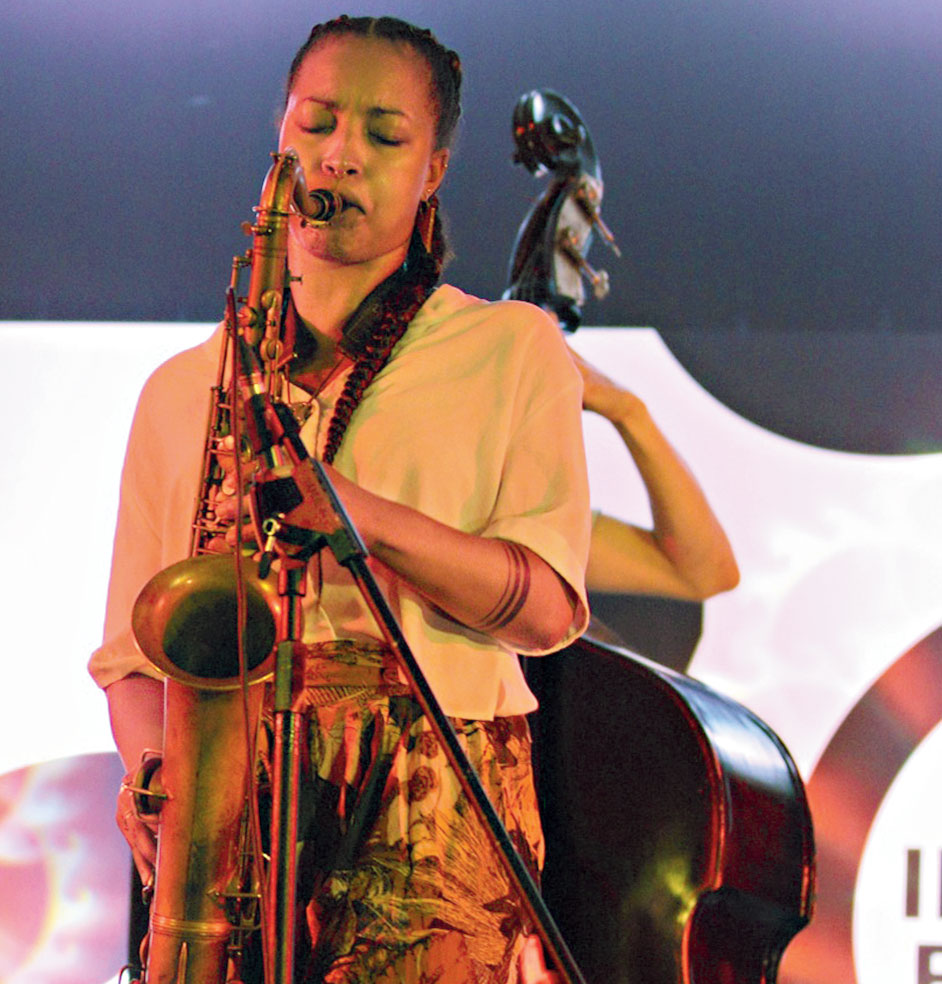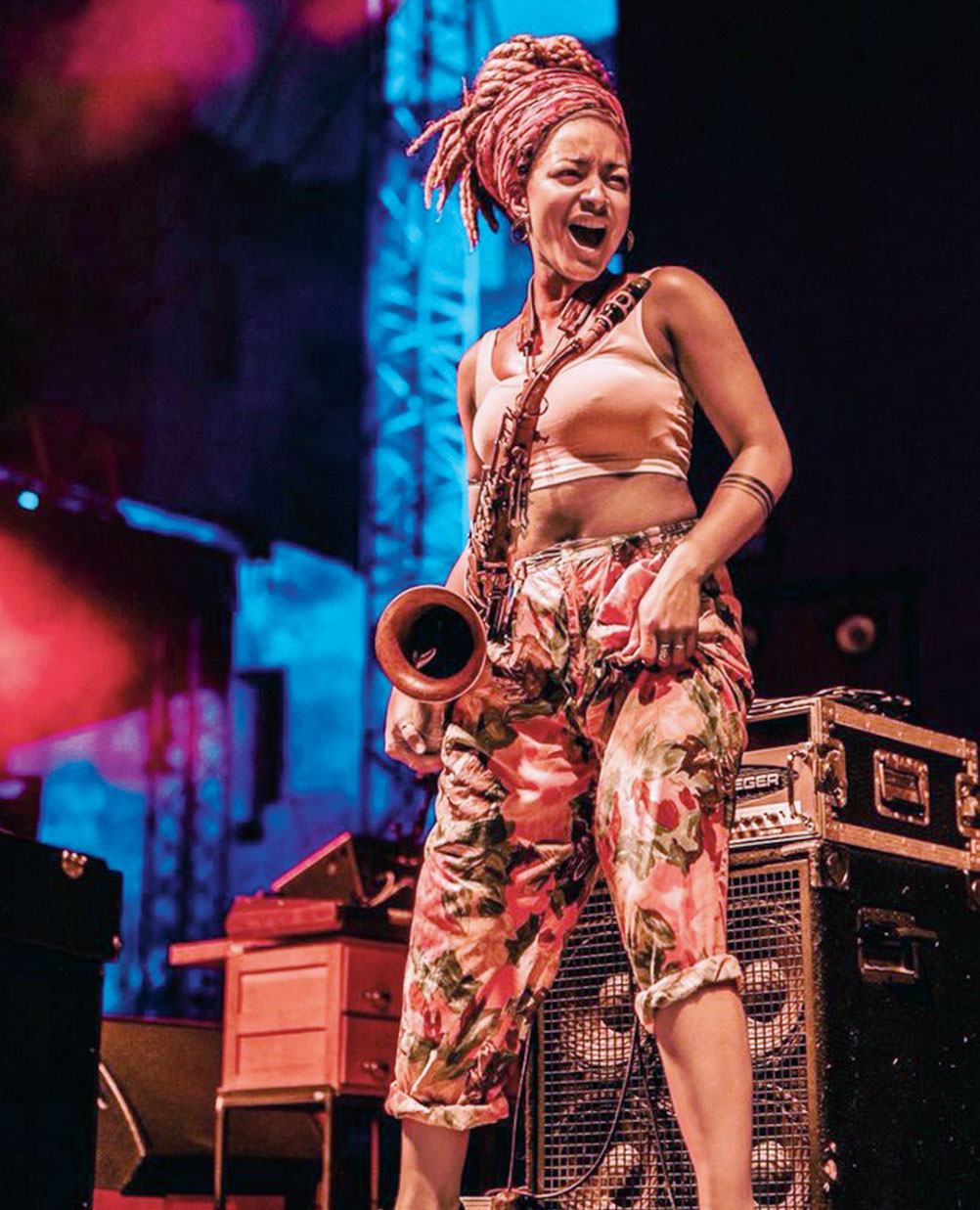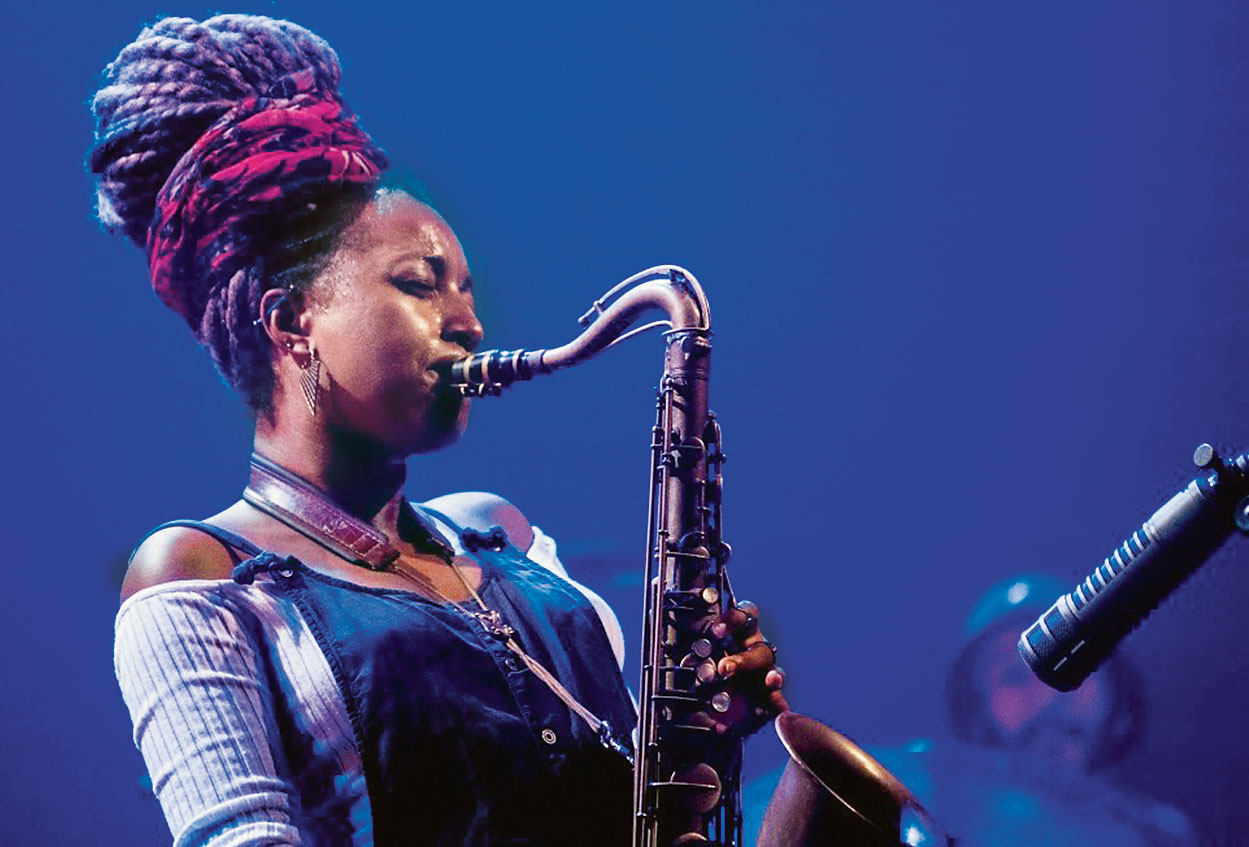She is this unusual band leader. She plays the saxophone, a huge brass one with an elegant sepia finish, and often, moves over to the wings, dancing to the riffs her co-musicians bounce off each other. The Nubya Garcia quartet has just stunned everyone into silence with her first tune, Static, on a Sunday at Calcutta’s Tollygunge Club, its first stop in a tour organised by British Council that’s celebrating 70 years in India. Playing it for the first time for an audience — “global premiere” she smiles — Static is explosive in the way the 26-year-old hits some high notes on the sax that pierce through a shield of booming bass, intricate keys and percussive drums.
Garcia’s music is jazz all right, but a different kind of jazz, the kind that eggs you on to the dance floor, the kind that contemporary London seems to have been nurturing, so much so that big-time DJs and independent record producers who travel the world scouring new sounds are being hit with curious queries about “the British invasion”.
“We grew up in an era where jazz is not the only music that we love, listen to and play. When you hear so many things you don’t just choose one of them. You kind of emulate,” she tells me enthusiastically after the performance, explaining why diverse cultural strains show up in her music. It helps she is from Camden, northwest London, a counter culture hub known for its grungy flea market and funky clothing. From Afro-Caribbean rhythms to hip-hop and neo-soul, Garcia is part of a London scene that is liberating jazz for a wider audience and loving it. This “new” music is played at night clubs and concert halls. Together with the likes of Moses Boyd (26, drummer), Shabaka Hutchings (33, sax, clarinet), Sheila Maurice-Grey (27, trumpet) and Yazmin Lacey (29, singer-songwriter), they have, The Guardian reports, knocked off the snooty from jazz as we know it.
The mix is evident by the time Garcia and her bandmates — Dominic Canning (keys), Michael Shrimpling (bass) and Jake Long (drums) — are on the second tune. Fly Free is this spacious canvass on which Garcia lines in a beautiful tune. It is gentle and sophisticated, the bass notes setting up a mystical background she feels the need to address by playing them herself on the sax while closing.
“I wrote Fly Free in January 2017. I am really into the 6-8 modal figures in the kind of music I listened to when I was young. So, I really wanted to experiment on modal beats,” she says about a style that is characterised by fewer chords and extended spaces for an improvising instrumentalist to fill in inventively (So What in Miles Davis’s A Kind of Blue is a stellar example). Not surprising that her list of influences would pretty much fill up that little black book of all jazz aficionados.
“John Coltrane is a huge influence. And Miles Davis, obviously. And then Herbie Hancock, Wayne Shorter, Ella Fitzgerald and Billie Holiday, Charlie Parker, Cannonball Adderley,” the 2016 graduate from Trinity Laban Conservatoire of Music and Dance continues. But her eyes light up talking about Dexter Gordon, the American tenor saxophonist who had a penchant for playing his notes ever so slightly behind the beat and who was himself an influence on Coltrane. “Dexter Gordon was the first sax player that I really, really got into.
I was 12 or 13 when I started listening to him.”
Garcia’s first album with six tracks called 5ive released on vinyl and CD, was re-issued thrice. Her next, When We Are, is a success too, having already been re-pressed once. Earlier this year, while playing at a music festival in Texas, there was a long queue of admirers, waiting to buy her EP immediately after her performance. But she was carrying only a handful with her. “Yes, that was amazing. I am still surprised,” she notes with relish.
With so much happening in the UK, are jazz musicians making enough in today’s world of YouTube and livestreams? Garcia is upbeat. She believes it is better than the past specifically for jazz as there are more venues open to hosting jazz nights. “We are not rock stars and it still isn’t as good as a salary, but you do get to see the world and meet people if you are lucky. In that respect its very enriching. I wouldn’t say it makes you rich, but you can get by.”
The key of course is originality. “It’s about creating something that’s true to you; not end up copying something that is doing well. It’s what you want to do, what you want to create, who do you want to play with. It’s individual and that’s what makes it special,” she outlines her philosophy before winding up.
On our way out, I ask Garcia about Coltrane’s Both Directions at Once: The Lost Album that’s surfaced now, 55 years after it was recorded. “Yes, I got it immediately. It’s incredible that they found it. I really like it. The amazing thing (about Coltrane), is he’s still giving us joy so many years later.”
Hours later, a tweet from Jazz at Lincoln Centre: “Happy birthday to a creative genius and titan of jazz: #JohnColtrane”. The Tolly Club gig was on September 23. We were discussing Coltrane but did not realise it was his 92nd birth anniversary. That’s joy. Pure fly-free joy.

Nubya Garcia at Tollygunge Club, Calcutta, last Sunday British Council, Calcutta

Nubya Garcia Source: Twitter
No wonder she’s going places. Garcia recently played at a do headlined by Erykah Badu, the American singer-songwriter-activist whose music I was reminded of while hearing her set — “that’s wonderful because she is a huge influence too” — and at the popular Love Supreme festival at Glynde Place in East Sussex alongside the great dame of soul Mavis Staples.
When We Are has traces of gospel, neo-soul and electronics, something she learnt from Sam Shepherd, the English electronic musician/producer who works under the title Floating Points. These London scene musicians will stop at nothing. The reach of their music seems endless. If jazz is about breaking fresh ground, it’s as though these guys have uprooted the picket fence around their homes, opening themselves up to anything and everything.
“It’s like five people tell you five different stories and then you go and tell another story, and you’ve got elements of all of those bits; and make it one big story. We were just fortunate to have grown up in an age when traditional jazz is still a big part of our lives. But we also go out to hip-hop gigs, raves, garage nights. We’re a product of this vast array of influences,” Garcia sums it up definitively.
For her, watching performances is a catalyst. “Often when you see a gig and it’s like, ‘ah, I want to go and write something now’. Sometimes it’s a tune or a groove in my head that I go on to produce by working out a bass line, the chords and so on.”
There are several facets to this creativity, channelled through various outfits. For instance, the one she is touring with in India (Bhubaneswar, Odisha; Itanagar, Arunachal Pradesh, for Ziro Festival of Music) isn’t her own band. Only drummer Jake and she have worked together as a part of another band, the spiritual jazz-inspired Maisha, for which they’ve spent hours playing as a duo and then fleshing out melodies and subsequently full-on compositions.
With so much happening in the UK, are jazz musicians making enough in today’s world of YouTube and livestreams? Garcia is upbeat. She believes it is better than the past specifically for jazz as there are more venues open to hosting jazz nights. “We are not rock stars and it still isn’t as good as a salary, but you do get to see the world and meet people if you are lucky. In that respect its very enriching. I wouldn’t say it makes you rich, but you can get by.”
The key of course is originality. “It’s about creating something that’s true to you; not end up copying something that is doing well. It’s what you want to do, what you want to create, who do you want to play with. It’s individual and that’s what makes it special,” she outlines her philosophy before winding up.
On our way out, I ask Garcia about Coltrane’s Both Directions at Once: The Lost Album that’s surfaced now, 55 years after it was recorded. “Yes, I got it immediately. It’s incredible that they found it. I really like it. The amazing thing (about Coltrane), is he’s still giving us joy so many years later.”
Hours later, a tweet from Jazz at Lincoln Centre: Happy birthday to a creative genius and titan of jazz: #JohnColtrane. The Tolly Club gig was on September 23. We were discussing Coltrane but did not realise it was his 92nd birth anniversary. That’s joy. Pure fly-free joy.











